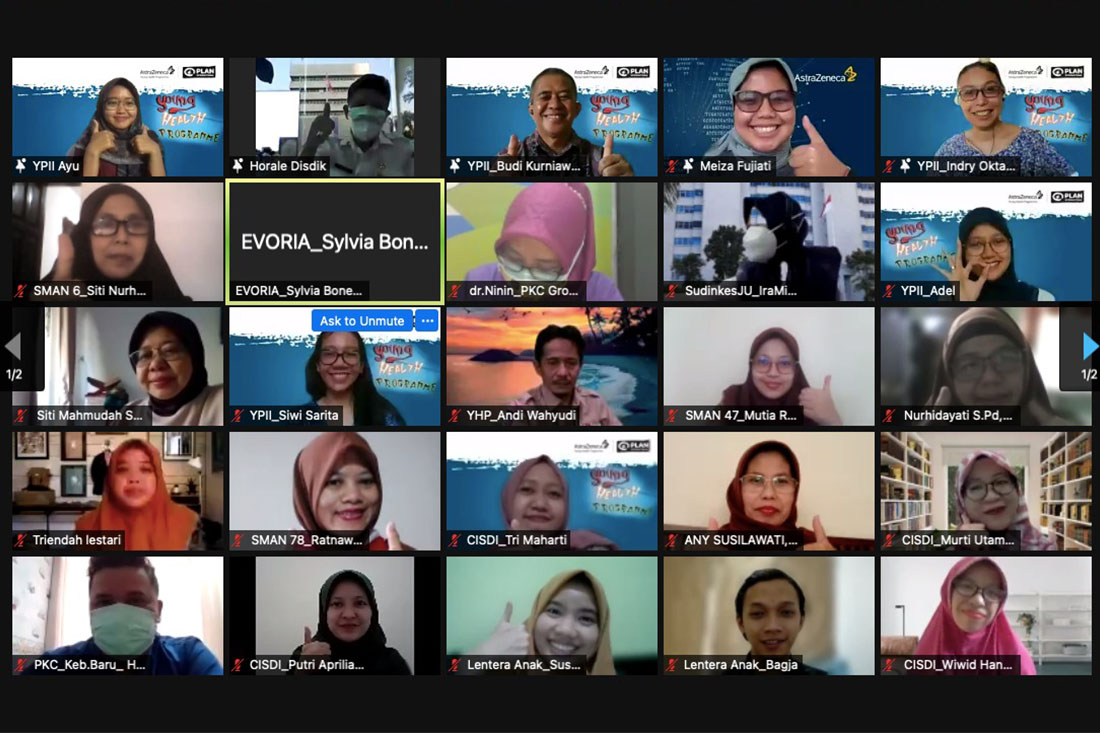
News
Preventing the Preventable, An Effort to Keeping the Children Away from NCDs
Putri Aprilia Regita • 26 Agu 2021
CISDI, Plan Indonesia, and Yayasan Lentera Anak held training of trainers (ToT) to 24 teachers and health professionals in West Jakarta, East Jakarta, South Jakarta and North Jakarta from Thursday to Friday. (Photo: Doc. CICDI)
Awareness on non-communicable diseases to teachers and children is necessary in preventing health problems in the future. Thus, the Center of Indonesia’s Strategic Development Initiatives (CISDI), Plan Indonesia, and Yayasan Lentera Anak committed to hold training on trainers (ToT) as a part of, and fully supported by, the Astra Zeneca’s Young Health Programme (YHP).
This program is also backed by AstraZeneca's Global Community Investment Initiativesin Indonesia through the assistance of Plan Indonesia. CISDI and the Yayasan Lenterea Anak as field technical implementing partners.
The ToT was to raise awareness of prevention of non-communicable diseases, the right to sexual and reproductive health, and emotional well-being for young people aged 10 to 24 years and was successfully targeted to 24 teachers and health professionals in West Jakarta, East Jakarta, South Jakarta and North Jakarta from Thursday to Friday (21-23/07).
According to WHO country profiles, 73% of deaths in Indonesia are caused by PTM. Other WHO findings describe 26% of premature deaths at the age of 30-70 years are also caused by PTM.
"Training of trainers facilitates teachers and health workers to pay attention to health and non-health aspects that affect the emergence of non-communicable diseases (NCDs) from an early age," said Wiwid Handayani, CISDI Project Officer for YHP.
Meanwhile, NCDs are highly preventable. However, it is the most vicious killer in Indonesia with deaths from cardiovascular disease and cancer being 35% and 12% of total deaths in Indonesia. Also, it affects productivity, especially for young people.
“Non-communicable diseases are diseases that are not transmitted directly from one person to another, but appear due to an unhealthy lifestyle," Wiwid explained.
Training and activities with teachers, health workers and children in the future will focus on eight main issues, namely life without smoking and alcohol, healthy diet, active exercise, breathing clean air, sexual and reproductive health rights, gender and gender equality, and emotional well-being.
“Avoiding smoking and alcohol from an early age is an important effort to prevent non-communicable diseases in the future,” added Putri Regita, CISDI Program Lead for YHP.
One of the most effective methods of instilling awareness of healthy living is through peer education. Through the ongoing ToT, teachers, and health professionals are expected to be able to instill healthy living values and direct students to become peer educators in their environment.
"Peer education that is carried out consistently and sympathetically is proven to be able to change the behavior of adolescents in a sustainable manner," said Wiwid.
It is hoped that through peer education, some healthy life outcomes will be found, by starting to actively engage in physical activity, staying away from smoking and alcohol, and growing interested in consuming healthy food.
Even though the ToT was only one of the first activities that had just been held, many parties, especially the participants, appreciated this program. Nurhayati, one of the participants who works as a teacher, as an example, admitted that she gained a new understanding through this training, especially regarding the relationship between gender and children's health. "The role of society is very important to support gender equality between boys and girls, especially in terms of health," he said. Nurhayati and 23 other participants are expected to be able to facilitate peer educator training which will be held in mid-August.
Even though the ToT training is only the first step, they are optimistic that the YHP training series will have a big impact on the children and youth involved in it. This agenda will be implemented in four administrative cities in DKI Jakarta Province, namely West Jakarta, East Jakarta, North Jakarta and South Jakarta that covers 40 schools and 20 health facilities (puskesmas), trains 320 peer educators, reaches more than 91,000 young people directly and 400,000 young people indirectly. YHP will also facilitate the training of 2,700 parents, 160 teachers and 160 health professionals over the next five years of the program's journey.
.png)